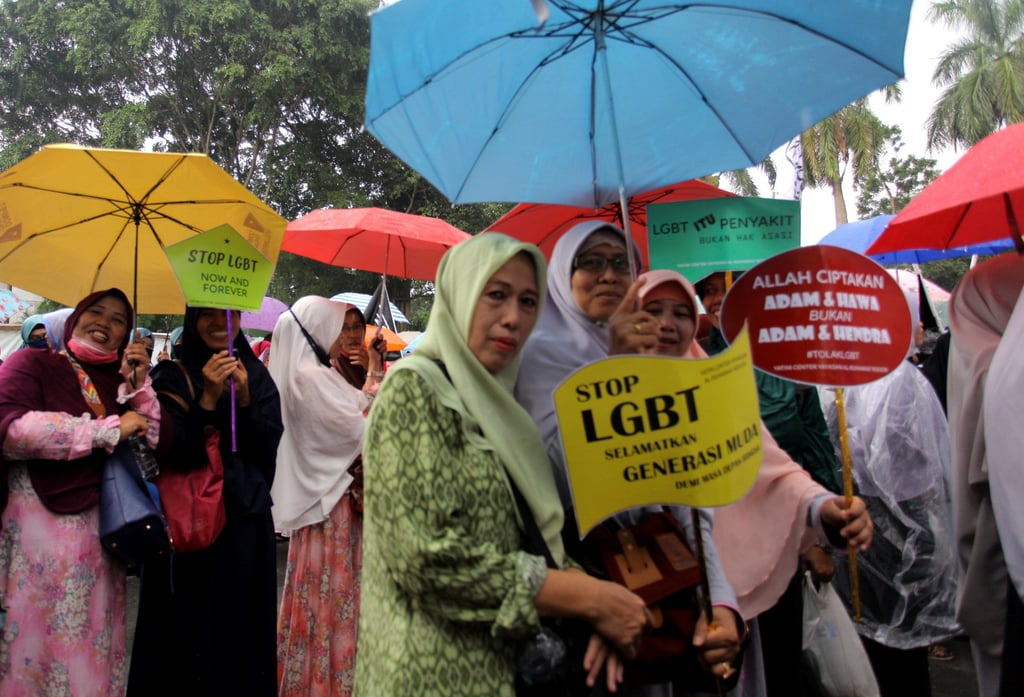Singapore Malay film with LGBTQ elements sparks ‘haram’ criticisms, calls for dialogue

Salam Gembira is screening at Filmgarde Cineplex at Leisure Park Kallang and has had its run extended to July 31 after its premiere on June 30.
Speaking to This Week in Asia, the film’s co-producer and writer, Remi M. Sali, said: “Whenever you talk about being gay and a Muslim, it’s a big no-no. There’s no room for discussion.”

He noted that the creators tried to make the film more palatable for conservative Singaporeans, including by minimising the physical contact between the gay characters and setting the story abroad.
“We thought that it was important to open the discussion after the repeal. It’s about showing how a Malay-Muslim family can handle such a situation, but the problem is that people tend to have tunnel vision,” added Remi, referring to the repeal of the law criminalising gay sex in Singapore on January 3 last year.
Co-producer Ho Pak Kin said they did not expect the backlash to be so intense. “There’s no dialogue because it’s just labelled as ‘haram’; it’s like if you’re gay you can’t be Muslim and if you’re Muslim you can’t be gay, end of discussion.”
In a TikTok post of a Reddit thread on the film’s release, which has more than 3,900 likes and 1,800 shares as of Friday, one online user said: “Next up, can eat pig products” while another wrote: “Singapore has fallen”.
Mohamed Imran Mohamed Taib, founding director of Dialogue Centre, said the taboo surrounding LGBTQ issues in Muslim societies stemmed from feelings of fear, shame and disgust, which were natural and understandable.

“Taboos take shape because of lack of encounters, prevalence of underlying assumptions, and presence of deep-seated prejudices. They are symptoms of a poor understanding of issues that are complex and nuanced,” said Imran, a founding board member of the Centre for Interfaith Understanding.
The negative responses to Salam Gembira were largely due to the framing of the movie’s content and intent by some online users as promoting the LGBTQ agenda, Imran said. The issues of cohabitation and premarital sex involving the main character, which were also considered sins in Islam, went largely unnoticed, he added.
While there would never be a common position regarding LGBTQ issues, Imran suggested having more discussions to foster deeper understanding and empathy among various parties.
“Developing this civic capability is what the Malay-Muslim community should be nudged towards. It begins with dialogue, which the movie had intended but unfortunately grossly misconstrued by certain segments of the community,” Imran said.
In response to queries from This Week in Asia, the Islamic Religious Council of Singapore (Muis) said that it was not in any position to comment on a film’s classification or reception from viewers.
It noted that LGBTQ issues were sensitive issues for many faith communities and said: “While it is not frequently and openly discussed, any discussions on LGBT topics within the Muslim community are approached with care and consideration for the diverse viewpoints and sensitivities of individuals.”
The backlash generated by the film has refocused attention on the difficulties faced by the entertainment industry to broach the topic of homosexuality in Muslim societies, despite more acceptance of LGBTQ rights in the region in recent times.
For conservative Malay-Muslim societies, it was not easy for them to discuss LGBTQ issues as many have not developed the civic frameworks and vocabularies to deal with the increasingly visible LGBTQ community, Imran said.
“This is compounded with the rise of religious identity politics where religious policing has become more prevalent, hence plunging the issue into a sort of ‘culture war’ between what is Islamic and un-Islamic in a binary form.”

NBC News reported in May that prominent Indonesian filmmaker Joko Anwar had described the proposal as “dangerous” and “impossible” to implement.
“The ban on such content not only impedes the creativity of the creative industry, and freedom of the press but also undermines people’s capacity to filter what they watch,” he said.
In 2022, Thor: Love and Thunder and Pixar animated film Lightyear, both distributed by Disney, were banned from Malaysian theatres due to LGBTQ elements that the studio chose not to cut.
However, LGBTQ elements are allowed in TV or film content, provided they are portrayed as cautionary tales.
One such production approved by Malaysian authorities was TV3’s 2022 drama Suamiku Lelaki Pendosa, centred around a gay main character whose life is derailed when a video of him having sex with another man is leaked online. The character loses his job and is ostracised by everyone except his wife, prompting him to commit to her and leave his gay partner.





